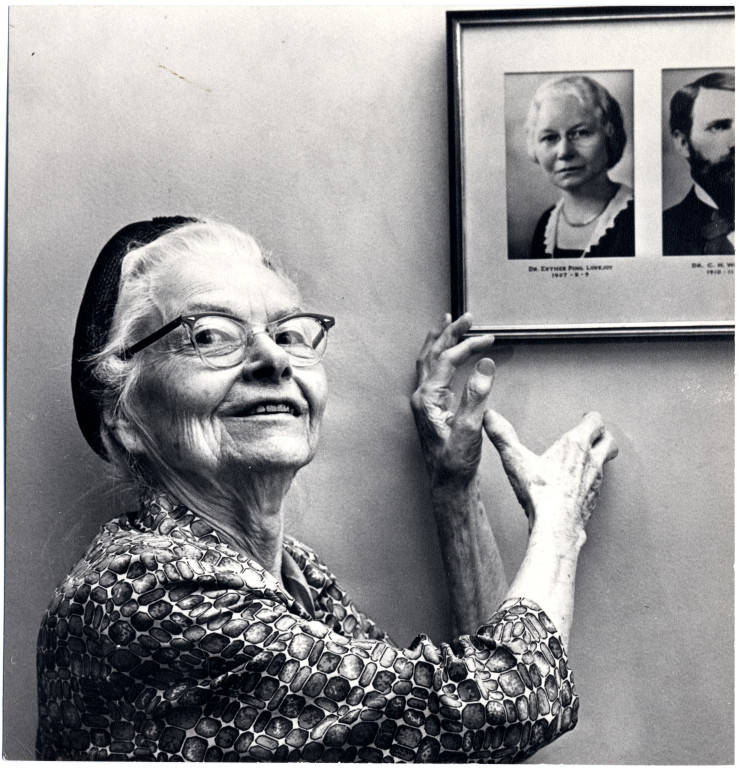
Photo of Dr. Esther Pohl Lovejoy via Wikimedia Commons
Almost everyone has advice they’d gladly give their younger self, so much so that Clemson University psychology professor Robin Kowalski and doctoral student Annie McCord, were moved to initiate a systematic study of it.
The first of its kind, this study compiled the responses of more than 400 participants over 30, whose hypothetical younger self's average age was 18.
The study’s data was culled from a survey conducted over Amazon’s crowdsourcing marketplace, MTurk. Respondents spent 45 minutes or so answering hypothetical questions online, receiving $3 for their efforts.
Money-grubbing, data-skewing shirkers were held at bay by question 36.
(Play along at home after the fact here.)
Kowalski and McCord’s findings, published in the bimonthly academic Journal of Social Psychology, echo many recurrent themes in their other survey of the same demographic, this one having to do with regret—the one that got away, blown educational opportunities, money squandered, and risks not taken.
Personality and situation figure in, of course, but overwhelmingly, the crowd-sourced advice takes aim at the fateful choices (or non-choices) of youth.
Some common pieces of advice include:
- “Be kinder to yourself.”
- “Always know your worth.”
- “The world is bigger than you think it is and your worries aren't as important as you think they are, just be you.”
- “Don't worry if you look different, or feel you look different, from most other people. There is much more to you than what others see on the surface.”
- “Don’t get so caught up in the difficulties of the moment since they are only temporary.”
- “Don’t dwell on the past. Just because it was that way doesn’t mean it will be that way again.”
There’s not much research to suggest how receptive the participants’ younger selves would have been to these unsolicited pearls of wisdom, but 65.7% of respondents report that they have implemented some changes as a result of taking Kowalksi and McCord’s survey.
Dr. Kowalski, who’s come to believe her “laser-focused on school” younger self would have benefited from some intervals of rose-smelling, writes that the better-late-than-never approach “can facilitate well-being and bring us more in line with the person that we would like to be should we follow that advice.”
If you want to double down, share your advice with children, preferably your own.
And for those who can’t rest easy til they’ve compared themselves with Oprah Winfrey:
Be relaxed
Stop being afraid
Everything will be alright
No surprise there.
READERS—WHAT ADVICE WOULD YOU GIVE YOUR YOUNGER SELVES? Add your advice to the comments section below. (The author’s is somewhat unprintable…)
For inspiration, see the Advice to My Younger Self Survey Questions here and the related survey dealing with regret here.
via Big Think
Related Content:
Stephen Fry: What I Wish I Knew When I Was 18
The Top Five Regrets of the Dying
Brian Eno’s Advice for Those Who Want to Do Their Best Creative Work: Don’t Get a Job
Ayun Halliday is an author, illustrator, theater maker and Chief Primatologist of the East Village Inkyzine. Her monthly installment book-based variety show, Necromancers of the Public Domain, will resume in the fall. Follow her @AyunHalliday.
What Advice Would You Give Your Younger Self?: What Research Shows, and What You Have to Say is a post from: Open Culture. Follow us on Facebook, Twitter, and Google Plus, or get our Daily Email. And don't miss our big collections of Free Online Courses, Free Online Movies, Free eBooks, Free Audio Books, Free Foreign Language Lessons, and MOOCs.
from Open Culture http://bit.ly/2LaVRbX
via Ilumina
Comments
Post a Comment